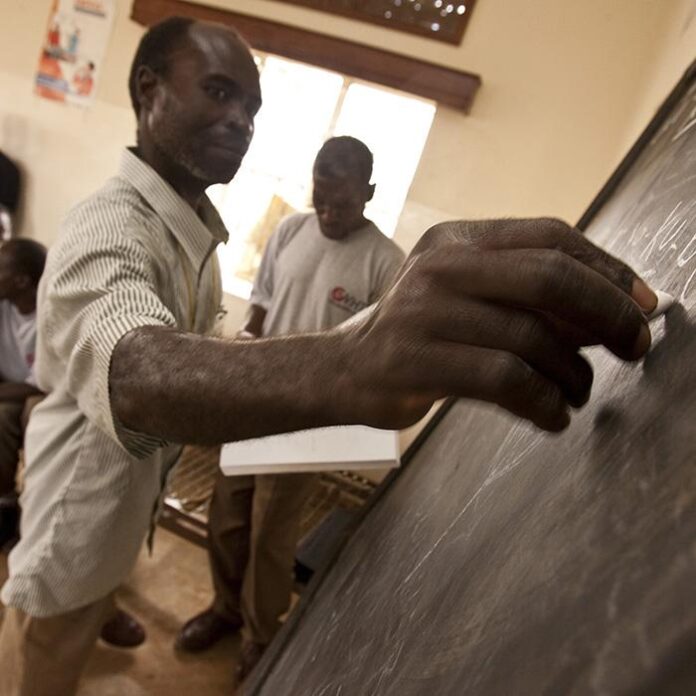By: Arnold R. Grahl
Published by Rotary International
Around the world, millions of adults are unable to read or write, and therefore struggle to earn a living for themselves and their families.
Even in the United States, with its considerable resources, there are 36 million adults who can’t read better than the average third-grader, according to the international nonprofit ProLiteracy. In Detroit, Michigan, a widely cited 2003 survey conducted by the National Institute for Literacy found that almost half of residents over age 16 were functionally illiterate — unable to use reading, speaking, writing, and computer skills in everyday life.
Kristen Barnes-Holiday, director of program outcomes for Reading Works, an organization tackling adult illiteracy in Detroit, says the agencies — many of them underfunded and understaffed — that have been trying for years to address the problem there have made little progress.
Illiteracy affects all areas of life. Those with low literacy skills are far more likely to live in poverty, face health problems because they can’t read prescription labels or instructions, and grow isolated in a world increasingly dependent on computers. And the lack of a skilled workforce, Barnes-Holiday notes, has slowed Detroit’s economic revival.
But she worries most about the impact on future generations.
“A lot of children are raised in households where parents are low-skilled or illiterate, and we all know only a certain amount of learning happens in the classroom,” she says. “We are raising this generation with the expectation that if we pour a certain amount of dollars into their education, we will get better results. But that is only partially true if we do nothing to address the households they are coming from.”
Rotary member Mark Wilson, who also has been involved with Detroit literacy efforts, agrees that adult literacy is not receiving the attention it deserves.
“It doesn’t pull at the heartstrings the same way as when you see a child who can’t read,” says Wilson, a member of the suburban Rotary Club of Grosse Pointe. “But, in fact, it’s a vicious cycle and it perpetuates itself.”
Wilson’s club, along with other Detroit-area Rotary members, partnered with ProLiteracy Detroit to raise money to recruit and train more tutors. Also, members have collected 261,000 books and 587 computers to donate to literacy agencies throughout the city.
A grant from The Rotary Foundation brought a team of literacy experts from Australia to Detroit, to share their expertise with those who are training the tutors. The grant helped launch a weekly program on local television to raise awareness and broaden corporate and community support.
Through the efforts of the volunteer tutors, more than 500 adults raised their reading levels by three grades, according to testing by the Michigan Adult Education Reporting System.
Margaret Williamson, executive director of ProLiteracy Detroit and a member of the Rotary Club of Detroit, said the project has produced benefits even beyond initial expectations.
“Not only do we look at reading, but we look at building the skills the individual will need for employment,” she says. “And what happened was that, through the Rotary network, [these adults] had access to people who knew other people who were willing to give them an opportunity. We had people call us and say, “Do you have a person who would be good for this entry-level position?’ ”
The Rotary members have become better advocates for adult literacy, influencing policymakers at several levels, adds Williamson. Among the results of that advocacy: A financial institution donated a banking center for vocational training, and ProLiteracy received more money for tutor training and has expanded its network of partners.
“The ripple effect is still benefiting us,” she says.
Wilson also talks about ripples.
“When you teach somebody how to read, they have that for a lifetime,” he says. “It ripples through the community, one by one. And that was our goal.”
Source: https://www.rotary.org/en/illiteracy-traps-adults-and-their-families-poverty
Comment: This is an interesting article because it talks about the problems of illiteracy in the context of being an organization that is currently advocating for adult literacy. This article touches on how adult literacy is treated different or can have different challenge to face than child literacy. It points out how there is not the same empathy towards adults who can’t read as there is for kids who can’t read. I think another interesting point this brings up is how both literacy and illiteracy are perpetuating cycles. If the adults can’t read it can affect a family, but also if adults do learn to read, it can positively impact and ripple throughout the community and allow other community members to learn to read.




